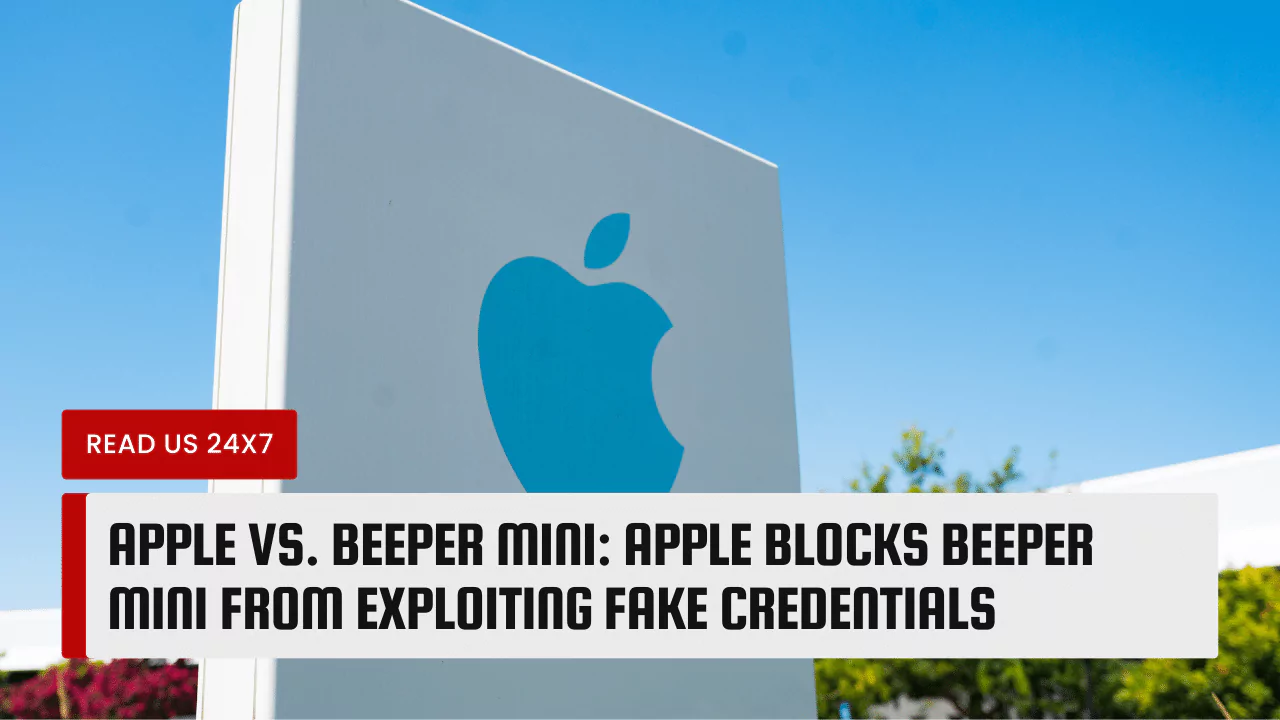Apple has recently blocked Beeper Mini, a third-party app that claimed to offer iMessage functionality on Android and Windows devices, from exploiting fake credentials to access its messaging service. This move has sparked a debate over Apple’s control over its ecosystem and the implications for user privacy and competition.
Apple Vs. Beeper Mini Statements
Apple’s Full Statement
At Apple, we build our products and services with industry-leading privacy and security technologies designed to give users control of their data and keep personal information safe. We took steps to protect our users by blocking techniques that exploit fake credentials in order to gain access to iMessage. These techniques posed significant risks to user security and privacy, including the potential for metadata exposure and enabling unwanted messages, spam, and phishing attacks. We will continue to make updates in the future to protect our users.
Beeper Mini’s Statement
The Beeper iMessage Saga
Background
Beeper Mini is a product of Beeper, a platform that aims to unify various messaging apps such as WhatsApp, Telegram, Signal, and iMessage under one interface. Beeper Mini was launched in October 2023 as a standalone app that promised to bring iMessage to non-Apple devices, without requiring a Mac or an iPhone as a bridge.
Beeper Mini claimed to use a “novel method” to achieve this feat, which involved creating fake Apple IDs and passwords for each user and using them to log into iMessage servers. Beeper Mini then relayed the messages between iMessage and the user’s device, acting as a proxy.
Exploiting Fake Credentials
However, this method was not only unauthorized by Apple but also potentially risky for users. By creating and using fake credentials, Beeper Mini violated Apple’s terms of service and bypassed its security measures. Moreover, by handling users’ messages, Beeper Mini had access to their personal and sensitive data, which could be compromised or misused.
Apple was not aware of Beeper Mini’s existence until December 2023, when it received a report from a security researcher who discovered the app’s shady practices. Apple then investigated the matter and found that Beeper Mini had created over 100,000 fake Apple IDs and passwords, and used them to access iMessage servers from various locations around the world.
Apple’s Response
Steps to Protect Users
Apple took swift action to block Beeper Mini from exploiting its service and protect its users. Apple revoked the fake credentials, disabled the accounts, and banned the IP addresses associated with Beeper Mini. Apple also issued a warning to its users, advising them to avoid using Beeper Mini or any similar app that claims to offer iMessage functionality on non-Apple devices. Apple urged its users to use only the official iMessage app on iOS, iPadOS, and macOS devices, and to enable two-factor authentication for their Apple IDs.
Statements from Apple
Apple also released a statement to the media, explaining its reasons for blocking Beeper Mini and defending its stance on iMessage. Apple said that Beeper Mini was a “malicious app” that violated its terms of service, compromised its security, and endangered its users’ privacy. Apple said that iMessage was a “core feature” of its ecosystem and that it had no plans to make it available on other platforms. Apple said that it was committed to providing its users with a “safe, secure, and seamless” messaging experience and that it would not tolerate any attempts to undermine its service.
Implications and Controversy
Impact on Beeper
Beeper, the parent company of Beeper Mini, was caught off guard by Apple’s move and faced a backlash from its users and the public. Beeper admitted that it had used fake credentials to access iMessage, but claimed that it had done so in a “secure and ethical” manner and that it had not stored or shared any user data. Beeper said that it was working on a “new and improved” method to bring iMessage to non-Apple devices and that it hoped to resume its service soon. Beeper also accused Apple of being “anti-competitive” and “monopolistic”, and said that it would challenge its decision in court.
Response from Other Companies
Apple’s decision to block Beeper Mini also drew reactions from other companies in the tech industry, especially those that compete with Apple in the messaging market. Some companies, such as WhatsApp and Signal, supported Apple’s decision and praised its efforts to protect its users and its service. They said that Beeper Mini was a “rogue app” that posed a threat to user privacy and security and that Apple had the right to defend its service from unauthorized access. They also said that they respected Apple’s choice to keep iMessage exclusive to its devices and that they welcomed fair competition in the messaging market.
Other companies, such as Telegram and Facebook, criticized Apple’s decision and accused it of being “selfish” and “anti-consumer”. They said that Beeper Mini was a “useful app” that offered users more choice and convenience and that Apple had no right to block it from accessing its service. They also said that Apple was abusing its power and dominance to lock its users into its ecosystem and that it was preventing innovation and competition in the messaging market. They called for Apple to open up iMessage to other platforms, and to allow users to switch between different messaging apps.
Senator Warren’s Criticism
Apple’s decision to block Beeper Mini also attracted the attention of Senator Elizabeth Warren, a vocal critic of big tech companies and a champion of antitrust regulation. Senator Warren slammed Apple for its “anti-competitive” and “anti-consumer” behavior and said that it was harming users and stifling competition. Senator Warren said that Apple was using iMessage as a “bait and switch” tactic to lure users into buying its devices, and then locking them in with its proprietary service. Senator Warren said that Apple was violating antitrust laws and that it should be broken up. Senator Warren also urged the Federal Trade Commission (FTC) to investigate Apple’s practices and take action against it.


